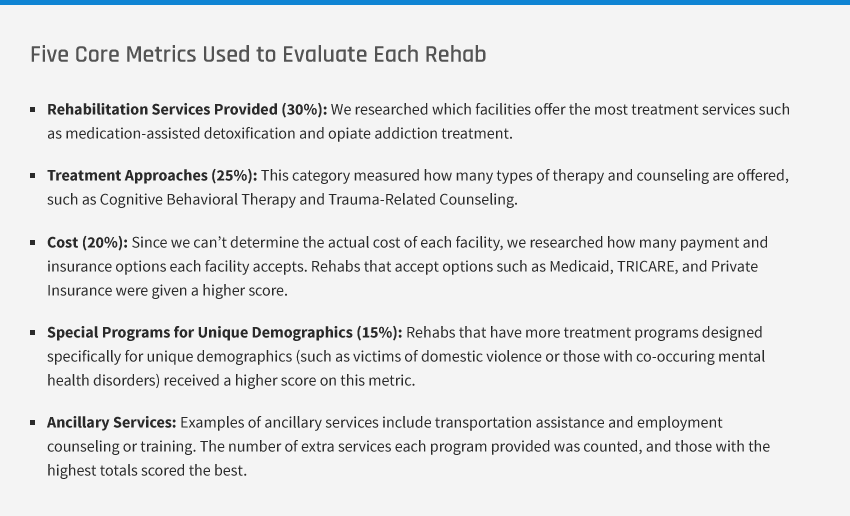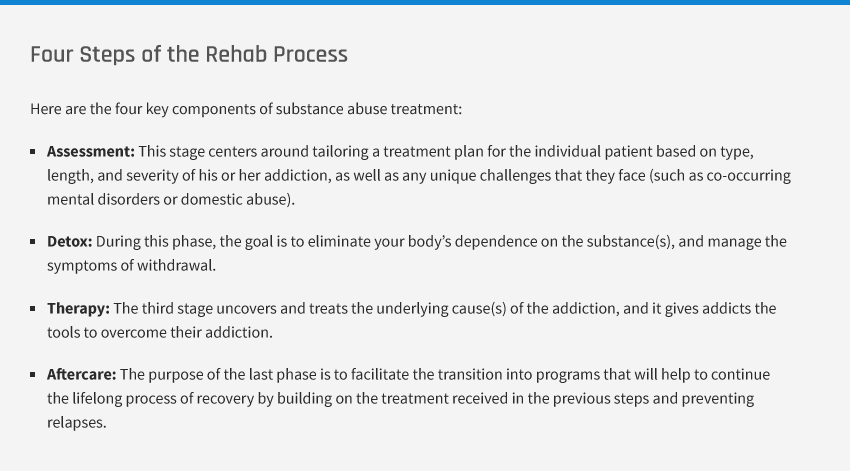Alcohol, Drug, and other Rehab Centers in Mesa, AZ
TABLE OF CONTENTS
- I. Getting Help
- II. The Best Rehabs in Mesa, AZ
- III. More Help in Mesa
Getting Help
What to Consider When Choosing a Rehab Center
When thinking about which rehabilitation programs and treatment options to explore, some important questions you should consider asking include:
- Which service setting is best for me? Read the following guides to understand residential inpatient programs and outpatient programs.
- Which specialized rehab programs do I need? Read about the differences between holistic rehabs, rehabs for dual diagnosis, and programs only for alcohol and drug detox.
- How long should I stay? Consider the differences between a shorter rehab length (30 days) or a longer-term option (60, 90, or 120+ days).
There are various factors that will impact your rehab options, such as the severity of your addiction, your financial position, and your unique personal situation.
For more information on how to make all of these decisions, read our guide to Choosing the Right Rehab.
The Best Rehabs in Mesa, AZ
The cost of rehab can be high, depending on your needs and location. Whether or not you have insurance, there are ways for you to get help breaking free of your addiction. According to the Substance Abuse and Mental Health Administration (SAMHSA), there are 156 substance abuse treatment centers in the Mesa area. Many of these organizations are on a mission to provide substance abuse recovery services to residents, regardless of their financial status. Of these 156 centers, Terros Health 27th Avenue Integrated Care Center has received the highest overall scores based on our five core metrics.

For more information about the five core metrics, head to the full breakdown of our filtering process and ranking methodology
1. Terros Health 27th Avenue Health Center
Terros Health 27th Avenue Health Center received an overall score of 7.9 points out of 10 possible points for its comprehensive substance abuse treatment services tailored to adult men and women. Its services include medication-assisted detoxification treatment and both regular and intensive outpatient programs, as well as accepting clients on opioid medication, which accounted for the center receiving the highest score in the category of Rehabilitation Services Provided. Clients can expect a multitude of treatment approaches, such as cognitive behavioral therapy, the Matrix Model approach, brief intervention approach, motivational interviewing/incentives, anger management, and relapse prevention, among several others.
The center scored moderately in the category of Special Programs for Unique Demographics; it offers programs that cater to individuals with co-occurring mental health disorders, clients referred from the judicial system, and patients who have experienced sexual abuse, intimate partner/domestic violence, and other forms of trauma. However, it scored highly for its comprehensive ancillary services. Examples include health education, social skills development, tobacco cessation counseling, housing and transportation assistance, mental health services, and many more.
Terros Health 27th Avenue Health Center accepts Medicare, Medicaid, TRICARE, IHS/Tribal/Urban (ITU) funds, Access to recovery (ATR) voucher, government funding for substance abuse programs, private health insurance, and self-payment. It also offers a sliding fee scale to clients based on income and other factors.
- Rehabilitation Services Provided: 9.24
- Treatment Approaches: 7.15
- Cost: 8.58
- Special Programs for Unique Demographics: 5.39
- Ancillary Services: 8.4
2. A Better Today Recovery Services
A Better Today Recovery Services scored 6.8 points out of 10 points in our rankings for its high-quality medication-assisted, outpatient, and telehealth treatment services for adults. The center does accept clients on opioid medication. Due to all of these factors, the center scored highly in the category of Rehabilitation Services Provided. However, it received the highest score for its wealth of treatment approaches, ranging from dialectical behavioral therapy to trauma-related counseling to 12-step facilitation approach to community reinforcement plus vouchers, and several more.
A wide spectrum of ancillary services complements substance abuse treatment. A sampling of these services includes peer support services, individual/group/marital/family counseling, treatment for non-substance use disorders, such as gambling; domestic violence services, social skills development, and many more. The center is somewhat limited in the number of unique populations to which it caters but does serve individuals with co-occurring mental health disorders and patients who have experienced sexual abuse, intimate partner/domestic violence, and other forms of trauma.
A Better Today Recovery Services only accepts private health insurance and self-payment to pay for treatment, resulting in it receiving the lowest score in the category of Cost. However, a sliding fee scale based on income and other factors is available to clients.
- Rehabilitation Services Provided: 9.24
- Treatment Approaches: 10
- Cost: 0.72
- Special Programs for Unique Demographics: 4.62
- Ancillary Services: 7.14
3. Terros Health McDowell Health Center
With 5.9 out of 10 points, Terros Health McDowell Health Center earned the third spot in our rankings for its regular and intensive outpatient treatment programs for adults, including medication-assisted treatment and its acceptance of clients on opioid medication. A wealth of treatment approaches are available to clients and include cognitive behavioral therapy, brief intervention approach, anger management, relapse prevention, and several more.
The center scored relatively low for its special programs catering to unique populations, but it does offer specialized care to individuals with co-occurring mental health disorders and clients referred from the judicial system. Ancillary services are a bit more plentiful and range from mental health assessments to HIV/AIDS education and support to tobacco cessation counseling and many more.
Terros Health McDowell Health Center scored highly in the category of Cost due to its multitude of payment options; it accepts Medicare, Medicaid and other state-financed health insurance, TRICARE, government funding for substance abuse programs, private health insurance, and self-payment, in addition to offering payment assistance and a sliding fee scale based on income and other factors.
- Rehabilitation Services Provided: 4.62
- Treatment Approaches: 7.15
- Cost: 8.58
- Special Programs for Unique Demographics: 3.08
- Ancillary Services: 5.88
Top-Rated, Low-Cost Treatment Centers in the Mesa Area
| Rank | Rehab | Total Score | Contact Information |
| #1 |
Terros Health 27th Avenue Health Center |
7.9 | 3864 North 27th Avenue Phoenix, AZ 85017 Main Tel: 602-685-6000 |
| #2 |
A Better Today Recovery Services |
6.8 | 15721 N Greenway Hayden Loop Suite 205 Scottsdale, AZ 85260 Main Tel: 480-351-1662 |
| #3 |
Terros Health McDowell Health Center |
5.9 | 4909 East McDowell Road Phoenix, AZ 85008 Main Tel: 602-685-6000 |
| #4 | Terros Health Stapley Health Center | 5.7 | 1111 South Stapley Street Mesa, AZ 85204 Main Tel: 602-685-6000 |
| #5 | Native American Connections | 5.6 | 4520 North Central Avenue, Suite 600 Phoenix, AZ 85012 Main Tel: 602-254-3247 |
| #6 | Transitional Living Communities Recovery Services | 5.6 | 32 South Macdonald Mesa, AZ 85210 Main Tel: 480-969-1471 |
| #7 | Native Health Central | 4.0 | 4041 North Central Avenue, Building C Phoenix, AZ 85012 Main Tel: 602-279-5262 |
| #8 | Jewish Family & Children’s Service Michael R. Zent Healthcare Center | 4.0 | 3001 North 33rd Avenue Phoenix, AZ 85017 Main Tel: 602-353-0703 |
| #9 | Family Service Agency Metro Office | 3.8 | 10240 North 31st Avenue, Suite 103 Phoenix, AZ 85051 Main Tel: 602-863-1862 |
| #10 | Family Service Agency Mesa Office | 3.8 | 943 South Gilbert Road Mesa, AZ 85204 Main Tel: 480-507-8619 |
Finding a Substance Abuse Treatment Center in Mesa
Start by determining your coverage
In order to determine your best options for a rehabilitation center, you’ll need to learn about your health insurance coverage. You can reach out to your private or healthcare marketplace insurance provider to find out which centers you are able to utilize. To learn if you qualify for low-income Medicaid services, and to determine eligibility, visit the Arizona Health Care Cost Containment System website. No matter the type of coverage you have, insurance companies – both public and private – must cover substance abuse treatment for qualified individuals.
Use our database to find a treatment center near you
The tool below lists all of the treatment centers in the state of Arizona recognized by the Substance Abuse and Mental Health Services Administration (SAMHSA). Input your zip code and select the filter icon to find relevant treatment centers near you.
Schedule an assessment
If you are pursuing treatment that will be covered by insurance, your first step will likely be scheduling an assessment by a qualified individual, such as a therapist or counselor. Most facilities provide assessments, or your primary care provider may be able to refer you. Contact companies in our database above to find out if they will provide this service.
Find a Rehabilitation Facility Near You
Filter Your Search
Popular Searches
Type Of Care
Treatment Approaches
Service Setting
Age Groups Accepted
Ancillary Services
Facility Operation
Facility Smoking Policy
Gender Accepted
Language Services
License Certification Accreditation
Payment Assistance Available
Payment Methods and Insurance Accepted
Special Programs Groups Offered
What to Expect in Rehab
Addiction treatment is a multifaceted industry, and there are numerous techniques and philosophies. As a result, the science of studying addiction is constantly shifting and improving. However, the core elements of rehabilitation are very similar.

For more on what to expect in rehab, read our guide on the addiction rehabilitation process
More Help in Mesa
Substance Abuse Programs for the Public
A variety of free or reduced-cost resources are available for residents of Mesa who are seeking assistance in dealing with their substance abuse issues. These resources can include, but are not necessarily limited to, Alcoholics Anonymous, Narcotics Anonymous, non-profit programs, governmental programs, and sober living facilities. The below table provides information on these types of substance abuse programs available in Mesa.
| Program Name | Location | Phone |
| East Valley Intergroup AA | 1320 E. Broadway Road, Suite 105 Mesa, AZ 85204 | 480-827-1905 |
| Easy Does It AA | 1241 E. Broadway Road, #14, 15 Mesa, AZ 85210 | 602-264-1341 |
| Mesa Alano Club AA | 145 E. 1st Avenue Mesa, AZ 85210 | 602-264-1341 |
| Road to Recovery AA | 5641 E. Albany Street Mesa, AZ 85205 | 602-264-1341 |
| East Valley Al-Anon | 1320 E. Broadway #109 Mesa, AZ 85204 | 480-969-6144 |
| Narcotics Anonymous | Varies | N/A |
| Recovery and Beyond NA | 245 West Mahoney Avenue Mesa, AZ 85210-1254 | 480-897-4636 |
| New Arizona Family, Inc. Halfway House | 4201 N. 16th Street Phoenix, AZ 85016 | 602-248-7993 |
| Spero House Sober Living | 1915 S. Cottonwood Circle Mesa, AZ 85202 | 480-287-7821 |
| Transitional Living Communities | 32 S. MacDonald Mesa, AZ 85210 | 480-833-0143 |
Substance Abuse Programs for Students
Students are typically a demographic that is at particularly high risk for substance abuse and addiction, usually due to peer pressure and the stress involved in performing at a high academic level. This combination of factors, among others, often leads young adults to partake in substance use to feel a sense of belonging or increase their level of productivity. Fortunately, the majority of colleges and universities in the United States recognize the prevalence and risks of substance abuse on their campuses. As a result, many of these educational institutions offer a variety of substance abuse programs for students, often for free or at a reduced cost. The below table provides information on the substance abuse programs available at colleges and universities in Mesa.
| Program Name | Location | Phone |
| Mesa Community College Counseling Services | 1833 W. Southern Avenue Mesa, AZ 85202 | Southern and Dobson Campus: 480-461-7588 Red Mountain Campus: 480-654-7720 |
| Arizona State University Recovery Rising | ASU Tempe Campus Tempe, AZ 85281 | N/A |
| Benedictine University Drug and Alcohol Abuse Prevention Program | Krasa Student Center, Room 116 5700 College Road Lisle, IL 60532 | 630-829-6046 |
| Scottsdale Community College Counseling Resources | Student Center SC-108 9000 E. Chaparral Road Scottsdale, AZ 85256 | 480-423-6524 |
Frequently Asked Questions
- Do I need to enter a substance abuse rehabilitation program?
Drug and alcohol addiction can impair productive functioning within an individual’s family, workplace, and the broader society. If substance abuse is negatively affecting core spheres of life, such as your personal relationships, work performance, finances, and physical and physical health, a rehabilitation program can be an essential step towards a well-balanced, sober life and a sustained recovery.
To determine your risk of being susceptible to a substance use disorder, consider taking answering the questions in the Tobacco, Alcohol, Prescription Medication, and Other Substance Use (TAPS) Tool, a comprehensive online assessment for substance misuse from the National Institute on Drug Abuse.
- How long will a substance abuse rehabilitation program last?
The length of time an individual spends in a rehabilitation program can vary, depending on the specific program and the unique needs of the individual. Generally speaking, rehabilitation programs can last from 28 days to over a year.
According to the National Institute on Drug Abuse, most addicted individuals require at least three months of substance abuse treatment to significantly reduce or halt their drug use, and the best outcomes result from long-term treatment programs.
Length of stay depends on factors such as the need for detoxification services, insurance coverage or ability to self-pay, and the presence of co-occurring medical or mental health issues.
- How does a substance rehabilitation program work?
Substance abuse rehabilitation programs begin with a comprehensive assessment. The most effective treatments evaluate drug abuse in an integrative manner, factoring in medical, psychological, social, vocational, and legal issues.
After an initial assessment, the second stage of rehabilitation may focus on a detoxification period that removes the offending substance’s toxins from the body. The rehabilitation process then proceeds with treating the underlying cause of the addiction.
Behavioral therapies are a cornerstone of this process, which typically involves addressing a patient’s motivation to change, providing incentives for abstinence, and replacing drug-using thoughts and behaviors with more constructive ones.
After a patient has gained the tools in therapy to overcome the addiction, rehabilitation evolves into an extended aftercare situation to reinforce and build on the progress made during treatment. Aftercare may involve accountability programs, counseling, support groups, sober living homes, and more.
You can find more detailed information on the rehabilitation process here.
- How much will a rehabilitation program cost?
A substance abuse rehabilitation program can range from free of charge to more than $25,000. Many programs commonly accept private health insurance, which can substantially reduce the cost of treatment. Some federal and state agency substance abuse rehabilitation programs can cost little to nothing.
Outpatient programs typically cost less than inpatient treatment depending on the specifics of the program, such as the duration, location, and services provided. Outpatient programs can range from $100 to $500 per session, while inpatient treatment can cost between $200 to $900 per day.
The cost of inpatient treatment reflects the advanced level of medical and psychological services that are provided to patients, including but not limited to 24/7 support, sober housing, and meals throughout the program stay.
- How can I find a substance abuse rehabilitation program near me?
The Substance Abuse and Mental Health Services Administration (SAMHSA) Behavioral Health Treatment Services Locator can be used to find high-quality substance abuse rehabilitation centers near you. You may also navigate to the “Rehab In Your Area” tab on the Help.org website to find the highest-rated rehabilitation programs in your city.
For more FAQs about rehabilitation programs, click here: https://www.help.org/addiction-rehab-faq/


